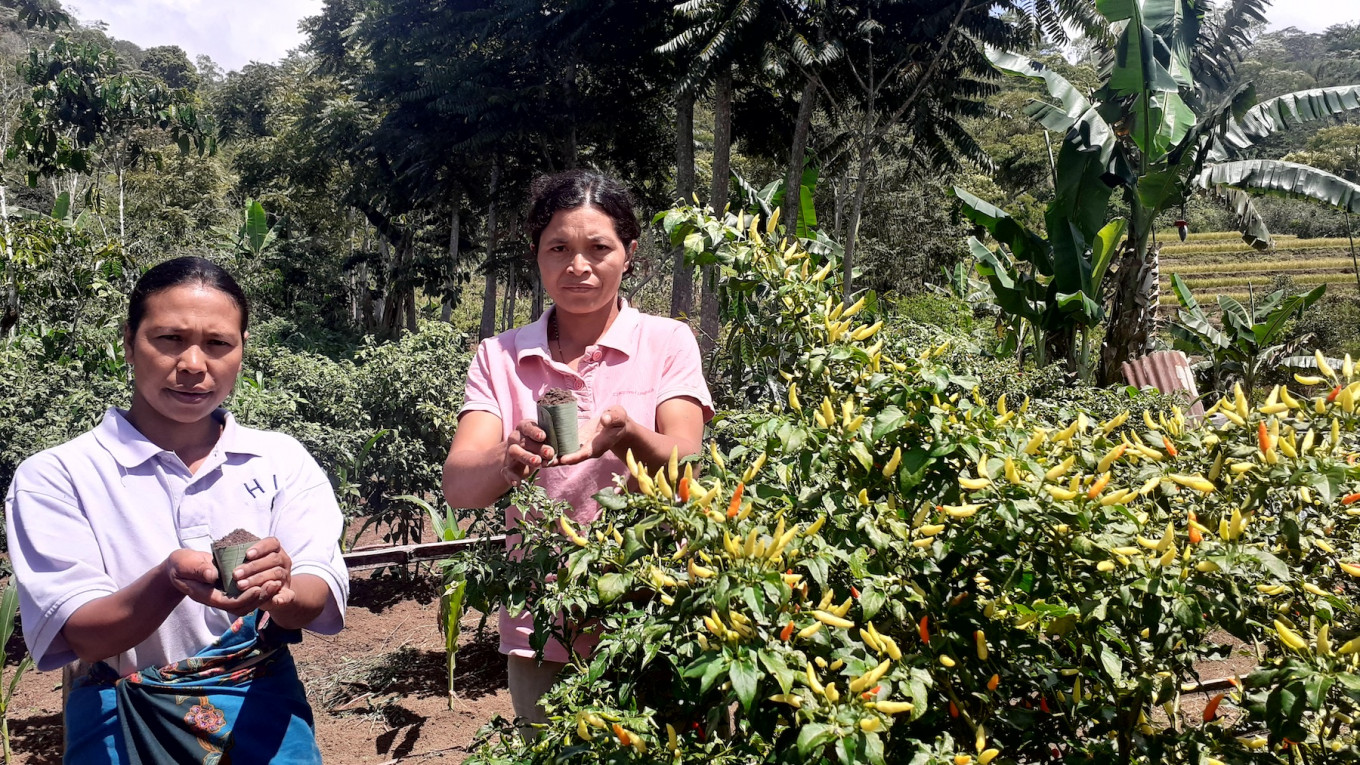Manggarai women turn to farming to put food on table
With a “build back better” approach, farming families in Manggarai of East Nusa Tenggara aim to emerge stronger from the COVID-crisis.
Change Size

M
o:p>Maria Sedis was picking ripe chilies grown on a plot of land belonging to Santo Robertus Bellarminus Tilir Parish in the East Manggarai regency of East Nusa Tenggara. Her friends, Fantiana Jemina and Kristiana Anu from Kampung Tilir were helping her harvest the popular ingredient to sell in the neighborhood.
“We also have sellers from the Ruteng and Mukun markets, who had called Father Rusmiadin,” Maria told The Jakarta Post earlier this month. The Catholic priest helps them market their produce through social media, especially WhatsApp groups.
The group has also grown other vegetables, such as tomatoes, since May this year. Three months ago, they sold their first yield and received Rp 12 million (US$854) in total. The proceeds from the sales were distributed to the parish and used to buy more seeds and cover the cost of tilling the soil.
Maria said the COVID-19 pandemic had made it hard for residents of Tilir and neighboring kampungs to obtain vegetables. The large-scale social restriction limited their mobility, so markets and shopping centers were closed.
In April, Maria and her husband Florianus Sandri Karno’s financial situation was in tatters because they could not sell their arabica coffee beans as the local administration had closed the markets for about two months.
“We were hit hard. We did not have any money, so we could not buy rice, soap, detergent and other basic necessities,” she said.
They also had no money to buy internet data for their oldest child to attend senior high school classes online. On government orders, schools across Indonesia halted all physical activities and moved classes online. Many students could not afford the internet quota or a smartphone or computer, while others did not even have an internet signal in their areas.
“I went to [the priest] in Tilir parish, Father Firminus Rusmiadin, and I asked for his permission to cultivate the idle land at the parish with vegetables,” Maria said. Her family did not have available land because they grew coffee bushes.
The parish not only allowed them to use the land but supported them by shelling out Rp 10 million to buy seeds and pay the farmers, including Maria and her two friends. “We thought letting the land be cultivated was part of the parish economy, and it’s also part of community empowerment,” Rusmiadin said. The parish paid each farmer Rp 50,000 per day for their labor.
In another village, in Komodo district, Maria Alfensia Surni, grew vegetables as well. After she had lost her job at a hotel, she rented a plot of land in June. Besides vegetables, she grows pineapples, marketing her produce through Facebook and WhatsApp.
“The technology has made it easy for me to market my produce, both vegetables and fruits,” said Maria Surni in November. Among her customers were tourism players and cruise ship managers in Labuan Bajo, a famous tourist destination in the province.
Surni decided to go beyond growing vegetables. She made banana and cassava chips as well. She was also teaching how to make the chips and learning how to make the tutorial video to be uploaded on YouTube.
Father Rusmiadin said farming during the pandemic had helped them keep the environment fertile. “Human beings should not be idle when many lands are idle. We should cultivate idle lands to get some money for the family,” he said. The priest also cultivated the land, along with other farmers.
What the parish and the women had done is an approach called “build back better” championed by the National Development Planning Agency (Bappenas). The program aims to prevent vulnerability and revive economic activity to bring about improvements through social, economic and environmental transformation.
“The revival after COVID-19 should not be oriented only at social and economic activity but also the environment,” said Egi Suarga, program manager of the LCDI World Resources Institute (WRI) Indonesia.
He said family farming could make use of a house’s front or back yard to grow food and use organic waste as fertilizer to increase the supply of food from family farming.
Egi said Building Back Better in Post-Disaster Recovery (GFDRR) is to build fairer. The key words were: poverty eradication, reducing inequality and reducing exposure to environmental risks. The program also makes women, indigenous people and vulnerable communities a priority to create equal access.
Markus Makur is one of the recipients of the Build Back Better fellowship organized by the World Resources Institute and the Society of Indonesian Environment Journalists (SIEJ).
This article is funded by the fellowship.









